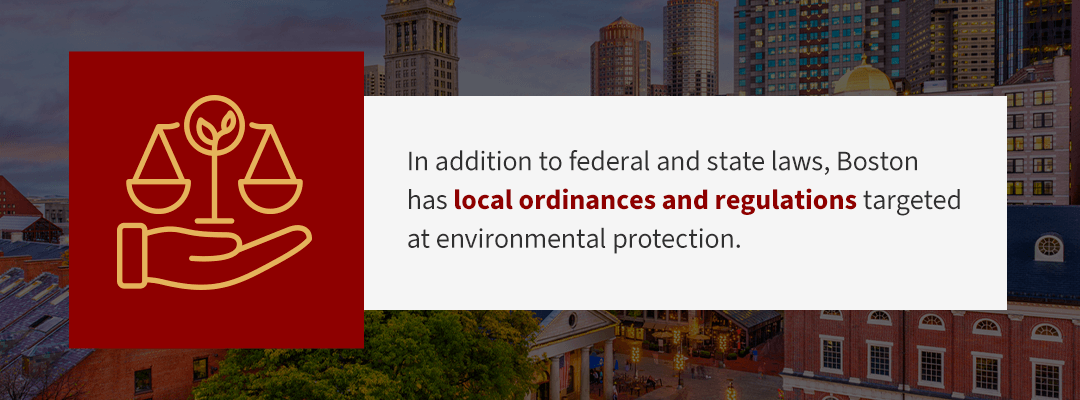Environmental law encompasses a range of regulations, standards, and legal principles aimed at protecting the environment. These laws apply to individuals and businesses. Boston has mandatory legislation and optional standards, and it is crucial to learn them and how they affect your activities.
This guide discusses federal, state, and local environmental laws and compliance strategies. You will also learn why hiring professionals is essential and how Calabrese Law Associates can help.
What Are the Environmental Laws in Boston?
Massachusetts environmental laws are broadly governed by federal and state legislation. However, some local ordinances or regulations apply in various cities, including Boston. Here is an overview:
1. Federal Laws
Several federal laws regulate activities that impact the environment in the United States. Classic examples include the following:
- Clean Water Act: The law regulates the discharge of pollutants into waters in the country.
- Clean Air Act: This comprehensive legislation regulates air emissions from mobile and stationary sources.
- Pollution Prevention Act: This legislation focuses on reducing pollution through cost-effective changes in operations, production, and raw material use.
Additionally, some standards apply to specific industries, such as the green building standards, primarily focusing on the construction sector. Generally, the Environmental Protection Agency (EPA) is the federal environmental policymaker but delegates much of its roles to the states. The states may implement policies to supplement those of the EPA.
2. State Laws
Massachusetts has numerous environmental laws. These laws have different focus areas but collectively aim to safeguard human, animal, and plant life. The state legislature has adopted most federal laws and implemented others as supplements. Examples include the air and climate, toxins and chemicals, water resources, and waste and recycling laws. The Massachusetts Department of Environmental Protection (MassDEP) is the primary enforcement agency.
3. Local Ordinances and Regulations
In addition to federal and state laws, Boston has local ordinances and regulations targeted at environmental protection. A good example is the Building Emissions Reduction and Disclosure Ordinance (BERDO), which aims to decrease greenhouse gas (GHG) emissions and air pollution generated by large buildings in Boston. Furthermore, the state has several environmental protection initiatives, including the following:
- Climate Action Plan: The plan aims to achieve net zero by 2050.
- Zero Waste Initiative: The initiative aims to move Boston toward zero waste through policy, planning, and community engagement.
- Boston Community Choice Electricity (BCCE): The program gives residents greater control over the electricity that powers their homes, small businesses, and places of worship.
Most of these federal, state, and local laws align with international standards and best practices. It is crucial to learn and comply with them strictly.
Who Must Comply With the Boston Environmental Laws?
Boston’s environmental laws are diverse. Some apply to individuals, while others apply to businesses. Examples of people or industries covered by these laws include:
- Developers and landowners: Real estate developers and property owners must comply with zoning laws and adopt sustainability practices during property development.
- Construction businesses: Contractors and subcontractors must comply with laws governing green buildings, waste management, and noise control.
- Manufacturing companies: Factories must adhere to regulations regarding emissions, waste disposal, and resource usage.
- Waste management companies: Companies must ensure the proper disposal and recycling of waste materials according to the local by-laws.
These are only a few examples. Compliance with Boston’s environmental laws is essential for protecting public health and the environment.
Land Use and Zoning Regulations
Land use and zoning laws play critical roles in environmental protection by regulating how land should be developed and used. They help preserve natural resources and historic sites, promote sustainable development, and reduce urban sprawl. Noncompliance can stall your project, and developing a property without the necessary permit can result in legal sanctions like fines.
The permit acquisition process in Boston involves the following steps:
1. Pre-Application Consultation
Consult the city officials to clarify the requirements. The key departments include the City of Boston Planning Department and the Inspectional Services Department. A real estate attorney can assess your situation, determine the required permit or license, and guide you.
2. Application Submission
Depending on the project, you may need various permits, such as:
- Zoning permits: These focus on land use and its impact on the community. For example, an area may be zoned for residential, commercial, or industrial purposes.
- Building permits: These concern the technical aspects of construction. Depending on the nature of the alteration, the permits may cover electrical, plumbing, and gas.
- Special permits: These permits allow you to use the land for a purpose other than what it’s been zoned for.
- Environmental permits: These are issued to protect various resources and apply depending on the project’s or building’s purpose.
Typically, you must provide documents such as the project plan, site surveys, and environmental assessments. You will also be required to pay a fee.
3. Application Review
The agency will review the application to ensure compliance with local zoning codes. Be prepared to provide additional information upon request. For certain permits, particularly special permits, the agency will schedule a public hearing to gather community input. Other city departments, such as the Environmental Department, Landmarks Commission, or Boston Redevelopment Authority, may also review the application if the project falls within their purview.
4. Decision and Post-Permit Requirements
The agency will issue a decision after the review. You will receive a permit if the application is approved. If the application is denied, the agency will let you know why, and you may have the option to appeal. Note that inspections may be required during and after construction to ensure compliance with the approved plan. A final inspection is usually needed to close out the permit.
You may face challenges during the permit acquisition process. For example, failing to comply with the regulations or submitting insufficient or inaccurate documents can cause delays. An attorney from Calabrese Law Associates can assist in navigating these hurdles.
Strategies for Complying With Environmental Laws
Environmental laws are complex, but the following strategies can streamline compliance:
- Learn the applicable laws: Familiarize yourself with the local, state, and federal environmental regulations.
- Monitor and report: Implement a monitoring system to track compliance with environmental laws and standards.
- Implement sustainable practices: Integrate sustainability into your operations, such as sourcing sustainable materials.
- Engage professionals: Consult professionals like environmental experts and attorneys for guidance.
Compliance with environmental laws requires a proactive and systematic approach.
Why Choose an Environmental Law Firm in Boston
Choosing an environmental law firm in Boston can provide significant advantages, such as:
- Local knowledge: Local attorneys with knowledge of Boston’s environmental regulations can explain your responsibilities and rights.
- Risk management and compliance: Environmental lawyers can examine your project and determine the applicable laws. This strategy can reduce legal issues and fines.
- Litigation and dispute resolution: Attorneys can provide legal representation during disputes. They can help you settle the matter or argue on your behalf if the case proceeds to trial.
Prioritize law firms with experience and a track record of delivering positive results.
Why Trust Calabrese Law Associates?
We are renowned for offering efficient legal services in the Greater Boston Area and beyond. Our team of trained attorneys has years of experience and knowledge of environmental laws. We have worked on complex cases for individuals and businesses and have the resources to deliver.
Our core values include developing practical solutions and providing excellent client services. We listen carefully to understand your case or project and develop personalized strategies to help us achieve the desired results. Our lawyers are honest, transparent, and friendly. We treat clients like family and aim to establish long-standing relationships. View our testimonials and reviews to learn more.
Calabrese Law Associates has won several recognitions and awards through hard work and commitment to our clients’ needs. Our close ties in our community have also been the secret to our tremendous success.
Consult an Environmental Compliance Attorney in Boston
Do you want to know how Boston’s environmental laws affect you or need help with a project? Calabrese Law Associates is ready to assist. Our lawyers will examine your matter and provide personalized legal support. We know the federal, state, and local laws and offer services like consultation, due diligence, and legal representation. To learn more, reach out to us now!
This publication and its contents are not to be construed as legal advice nor a recommendation to you as to how to proceed. Please consult with a local licensed attorney directly before taking any action that could have legal consequences. This publication and its content do not create an attorney-client relationship and are being provided for general informational purposes only.
Attorney Advertising. Prior results do not guarantee a similar outcome.




